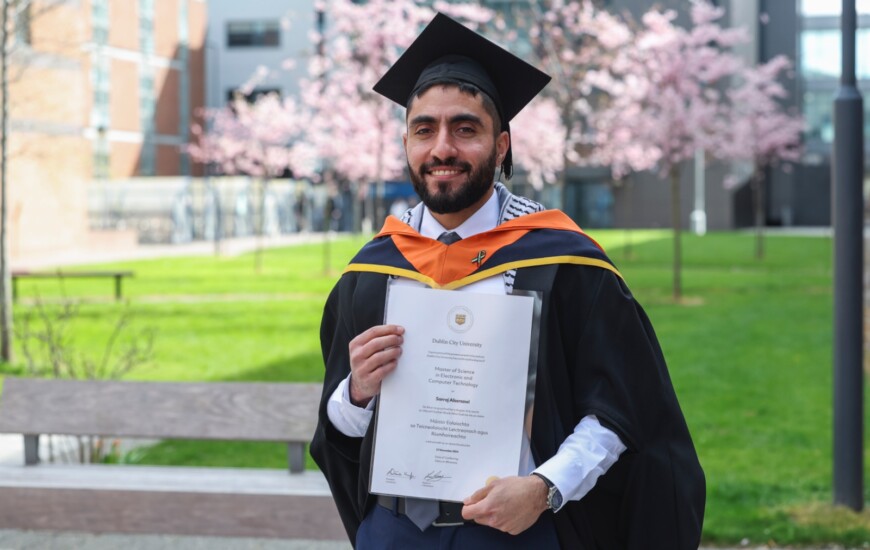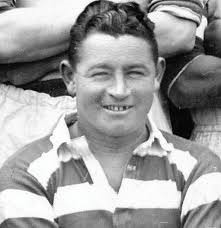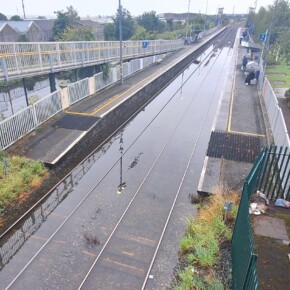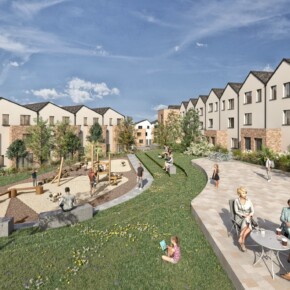Gazan student graduates top of class at DCU
Padraig Conlon 31 Mar 2025
Sarraj Alsersawi is rightly proud of coming top of his class in Dublin City University’s MSc of Electronic and Computer Technology (Internet of Things).
What is more remarkable is that the Palestinian student achieved this while the war in Gaza claimed the lives of many of his friends and threatened his family’s safety on a daily basis.
“It was a very challenging period, to be honest,” reflects Sarraj.
Sarraj arrived in Dublin from Gaza in September 2023 as part of the Ireland-Palestine Scholarship Programme (IPSP) to study for his master’s.
With a background in Mechatronics, Sarraj earned his undergraduate degree at Al Azhar University, Gaza where he went on to work as a teaching assistant.
He was looking for a master’s option in Ireland and liked the fact that DCU was a “young university” and the modules were a good fit with his interests.
Another aspect that caught his eye was that some of his undergraduate books were written by members of DCU’s Faculty of Engineering and Computing.
The early positivity of his DCU experience was completely overshadowed by the outbreak of war in his native Gaza following the October 7th Hamas attacks on southern Israel.
As the war raged, he was constantly worried about the safety of his family. “At one point I lost contact with my family because of the blackout of the Internet and communications and everything. So it was really stressful at that point.”
Ultimately, his parents and brother managed to escape the conflict, finding refuge outside Gaza. However, Sarraj’s thoughts were also with his friends and colleagues at home.
His former University, Al Azhar, “was completely flattened” by Israeli shells and Sarraj lost friends, colleagues and students in what he describes as “this genocide”.
Sarraj says DCU and particularly the programme chair Dr Derek Molloy were very supportive, offering him the option to defer exams due to his extraordinary circumstances.
However, he decided the only way to cope was to throw himself into his studies.
“I didn’t have the luxury to just sit down and do nothing and I thought that maybe excelling in my education would be the best way forward for myself and my family.”
In spite of his situation, Sarraj got first-class honours in his final exams and came first in his class. “I’m proud of that,” he says.
“The modules included in the programme were just what I needed to enter the Irish job market,” says Sarraj, who quickly secured a job in Cork with multinational company Stryker.
The company, based in what he jokingly describes as “the real capital” develops medical devices.
Sarraj says the job is a great fit for him, as he is passionate about using his qualifications to improve people’s quality of life.
“Some people would like to work in the automotive or other industries but for me, the medical device industry adds purpose and meaning to what I’m doing.”
He is enjoying his new role and is currently working on the development of a new electrosurgical unit, which uses high radio frequencies to cut tissue and control bleeding by causing immediate coagulation.
Even though his parents and brother are safe, the new year brought more distressing news for the family. On January 1st their house was destroyed by Israeli bombardment.
Through all of this, music has kept him going. Sarraj is a talented musician who plays the traditional Arabic instrument the Oud and has played with the Gaza Orchestra.
“Music is an essential part of my life and it also helped me immensely during that time to be able to play music. It helps a lot.”
Since coming to Ireland he’s played several charity concerts for the Palestine Children’s Relief Fund. Meanwhile, he’s started learning to play the mandolin. “I’m slowly getting into the trad music scene,” he says.
Reflecting on what is next for Gaza, Sarraj points out that the war has claimed the lives of a large proportion of the region’s professional people including engineers, medics and academics. He feels a sense of responsibility to return home whenever the rebuilding phase begins.
“It’s essential for us young people who were able to get a good education at some point to go back and try to help rebuild their communities at some point. It’s a bit early now, but this is something that I always keep in the back of my mind.”











